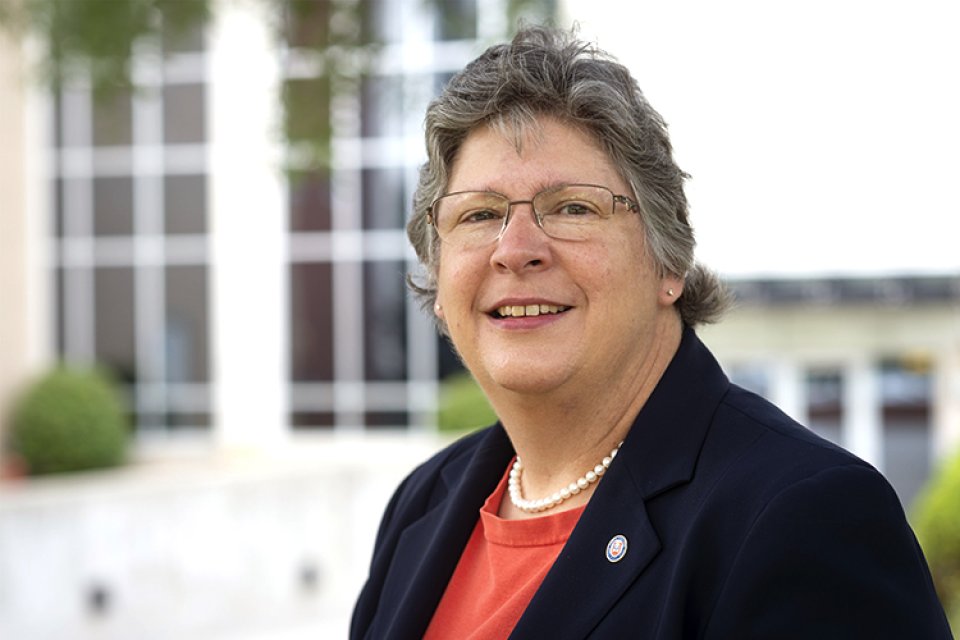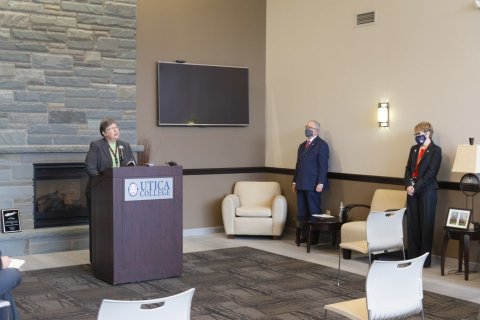Exciting Research, Developments on the Horizon for Utica’s Institute for the Study of Integrative Healthcare

"Our faculty have the expertise and innovation to consider many dimensions of integrative healthcare, and the timing of the Institute to provide support for our faculty couldn’t be better."
On Oct. 28, 2020, President Laura Casamento announced the establishment of the Utica University Institute for the Study of Integrative Healthcare, made possible through a multi-year gift commitment from anonymous donors totaling $2.8 million. During the news conference, Casamento explained how the Insititute will promote advanced learning and research in the emerging field of integrative healthcare, which brings together a broad range of practices in support of patient health and well-being.
Since then, professor of education and founding director Patrice Hallock, along with her colleagues, have been hard at work. Priority one: the national search for a director.
“We are looking for a seasoned professional with experience in higher education as well as healthcare,” says Hallock. “The right candidate will continue the capacity-building that we’ve begun and grow the Institute’s research and educational events.”
At the same time, faculty members and Utica’s partners in healthcare are engaged in various research projects across several disciplines—all focused on issues of mental and physical health and well-being. We recently talked with Hallock to learn more about the Institute’s progress, the high-level research already underway, and what the future holds.
For many people, the gift announcement last fall was the first they'd heard of “integrative healthcare.” Can you explain what it means?
“Integrative healthcare” can mean different things to different people. We are using an inclusive definition that crosses academic disciplines. Simply put, integrative healthcare considers health and well-being in many dimensions of daily life and is holistic, patient-centered care. It can include attention to biological factors, such as a person’s predisposition to disease, as well as environmental factors, such as where a person lives. There are also social and economic factors related to health: We know that individuals in middle- and upper-income brackets are generally healthier than people impacted by poverty. “Integrative healthcare” considers all these factors, in addition to the range of practices that people use to support their health and well-being.
What are some common misconceptions or myths about integrative heath practices? Can you dispel them?
Sometimes the term “integrative health” is used with the term “complementary and alternative medicine” or CAM. A “complementary” practice is one that is used in conjunction with mainstream healthcare, whereas an “alternative” practice would be one that is used instead of mainstream healthcare. The National Institute of Health identifies commonly used complementary and/or alternative practices as massage, acupuncture, yoga, and meditation, and natural products such as herbs, fish oil, melatonin, and probiotics. “Integrative healthcare” in this sense would bring complementary and alternative practices, which have their origins in Eastern medical traditions, together with Western medicine, which is mainstream in the United States. The goal of the Institute for the Study of Integrative Healthcare does not stop with Eastern and Western medical practices; we are considering the full range of factors that impact health and well-being, not simply the practices that people use to maintain their health and well-being.
The goal of the Institute for the Study of Integrative Healthcare does not stop with Eastern and Western medical practices; we are considering the full range of factors that impact health and well-being.
How have students responded to news of the Institute? What are they most looking forward to?
At this point, students may be largely unaware of the work of the Institute because the Institute is so new, and much time and attention are directed at managing our lives in this pandemic. Our work with the Institute most immediately is focused on capacity-building. Once we build the structure for faculty to leverage Institute funding to conduct research that influences their teaching, students’ educational experience will be impacted. They will be able to join faculty in their research endeavors, and students will be more likely to explore issues and concepts related to integrative healthcare as part of their own research. Our students conduct research with faculty mentors at both the undergraduate and graduate levels, and the Institute is here to support that work through release time for faculty and other opportunities.

Is there an academic program or programs that will benefit most from the establishment of the Institute?
The Institute for the Study of Integrative Healthcare crosses academic disciplines. The administrative structure resides outside each of the three Schools at Utica College; the Director reports to the Provost and VP for Academic Affairs. This structure is intentional to promote faculty research across programs and Schools and to underscore the notion that health and well-being are related to just about everything we do at Utica College. For example, do you know that faculty in Construction Management are LEED certified? LEED (Leadership in Energy and Environmental Design) is a “green building” rating system and provides a framework for healthy, highly efficient, and cost-saving green buildings. Did you know that we have faculty in Data Science and Economics who are working to discover the economic impact of COVID-19? Simply put, the Institute is here to support faculty research and student learning across the institution, and I do not foresee that any one program will benefit any more than another! This is very exciting for Utica College!
You're in the midst of a national search for an Institute director. Tell me about the skills and experience a potential director would need.
The perfect candidate will build and work with an advisory group that provides oversight, leadership, and support for Institute activities in research, clinical services, and education, and who will regularly evaluate the quality of achievement of the Institute’s goals and mission. We need an individual who can work effectively with faculty across all UC campuses (Utica, Liverpool, Miramar, and St. Petersburg), the administration, and the community in all geographic areas.
Are there any research projects currently underway?
Yes! The Institute is currently supporting a study of acupuncture and the reduction of neck pain in collaboration with healthcare and corporate partners in Florida. Faculty in child development and sociology are designing a study to explore practices that families employ and how they are supported by their family healthcare providers. Faculty in nursing, occupational, and physical therapy will examine strategies used by our local immigrant and refugee population to consider how we can more effectively support their overall health and well-being. As mentioned earlier, we have faculty in data science and economics who are studying the economic impact of COVID-19. We also have faculty interested in a cross-cultural study of the use of herbal remedies. Our faculty have the expertise and innovation to consider many dimensions of integrative healthcare, and the timing of the Institute to provide support for our faculty couldn’t be better!
Can you explain how the Institute will operate without a designated physical space?
The Institute does not yet have a physical home, but that doesn’t mean that it won’t have one in the future. The Institute for the Study of Integrative Healthcare is mostly a virtual entity at this point. We are building relationships with community members, educating our faculty about research opportunities, building the Institute infrastructure for an advisory group, our operational plan, and other details. With many in higher education and the larger community working remotely right now, we did not see the need to rush into a physical location. Moreover, the Institute Director will be expected to leverage technology to conduct business across a large geographic area as we engage our partners in Florida and develop partnerships locally, regionally, nationally, and abroad. The pandemic has taught us the value of leveraging technology for good, and we will capitalize on what we have learned well into the future, long after the pandemic becomes history.
My vision is that, in the next five years, we have faculty research that is on-going, collaborative, reaches across disciplines and Schools, and is embedded in the community for high-impact, and engages our students at all levels.
Where do you see the Institute in the next several years? How will its establishment impact the College as a whole?
It is exciting to think about the growth and development of the Institute over the next decade! I envision a time when people are no longer asking, “what is integrative healthcare?” because “integrative healthcare” will become part of our vernacular. Integrating and considering the many factors that influence our health and well-being will become an assumed part of how we take care of ourselves and others. My vision is that, in the next five years, we have faculty research that is on-going, collaborative, reaches across disciplines and Schools, and is embedded in the community for high-impact, and engages our students at all levels. That study will be shared via professional conferences at Utica College, much like our Integrative Healthcare Strategies Conference in 2019, and through our professional networks world-wide, just like our faculty are already doing. Ten years from now, I expect that healthcare practitioners and consumers alike will look to Utica College for the latest research and thinking about integrative healthcare and applied, high-impact collaborative research. Students will come to Utica College looking for the same liberal arts and professional programs they have sought for years, and they’ll graduate with an understanding of how everything from government policy to building construction can impact our health and well-being.
Utica College is a little college that does big things. Given the capacity of Utica College faculty to innovate and the willingness of our administration to support new endeavors, I am very excited for our future.
Interested in learning more about the Institute for the Study of Integrative Healthcare? Sign up for the Institute's newsletter. Send your name, class year (if applicable), and contact information to uticamag@utica.edu



